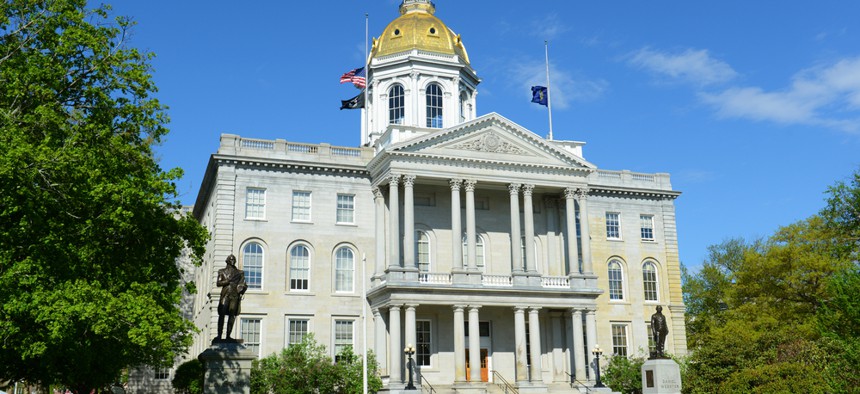D.C. Residents: Don't Even Try to Buy Booze in New Hampshire

The New Hampshire State House in Concord. Shutterstock
Residents of nation’s capital are technically out of luck with Granite State alcohol laws.
Residents of the District of Columbia don’t have full and equal representation in Congress. And in New Hampshire, they don’t have the legal right to purchase alcohol.
As D.C. resident Travis Mitchell and a group of friends found out recently at the Concord Food Co-op, they weren’t allowed to purchase alcoholic beverages because the store was adhering to a New Hampshire law on official photo identification requirements for alcohol sales that doesn't address the status of residents from the nation’s capital.
The Concord Monitor reported this weekend:
According to state law – RSA 179:8 – businesses that sell alcohol can accept four types of legal proof of age: a passport, a military card, or a driver’s license or photo identification from any of the 50 states, as well as provinces of Canada. Not once is the District of Columbia, or any of the U.S. territories, mentioned.
“It’s just one of those quirks,” said Joshua Bourassa, customer service manager at the co-op.
It’s unclear how many New Hampshire establishments actually enforce that legislative gray area for IDs from D.C. and U.S. territories and how many D.C. residents have been impacted by it on visits to the Granite State since the law was put on the books in 1990.
Bourassa said the food co-op runs into similar situations three or four times a year.
D.C. residents aren’t strangers to their unique residency status.
In February, a Transportation Security Administration agent in Phoenix initially stopped a D.C. resident from passing through an airport checkpoint because the passenger didn’t have official identification from one of the 50 states. (The situation was quickly rectified by TSA managers, The Washington Post detailed at the time.)
New Hampshire has been previously sympathetic to D.C.’s one-of-a-kind status as a jurisdiction that is not legally one of the 50 states and a place where its residents do not have full and equal representation on Capitol Hill.
In March, New Hampshire House lawmakers in Concord approved a resolution, H.R. 21, on a 143-133 vote “expressing support for the right of residents of the District of Columbia to be fully represented in the Congress of the United States of America.”
As CQ Roll Call reported at the time:
State Rep. Cindy Rosenwald, the Democrat who sponsored the legislation, told CQ Roll Call earlier this week that residents of the Granite State take “early American values,” including no taxation without representation, “very seriously.”
Don’t forget — the state motto is: “Live free or die.”
As a constitutionally-designated congressionally-administered jurisdiction, the District of Columbia lacks full and equal voting representation in the U.S. Senate and House of Representatives. D.C. Delegate Eleanor Holmes Norton is a member of the latter legislative chamber, can speak on behalf of the interests of D.C. residents and can vote in committee but does not have to right to vote with her colleagues on the final passage of legislation.
Residents of the nation’s capital can vote for mayor, members of the D.C. Council and other local positions in addition to the House delegate and members of a shadow congressional delegation that is not recognized by Congress but work to advocate the expansion of voting rights for D.C. residents. The 23rd Amendment to the U.S. Constitution allows the District residents to vote in presidential elections.
Many D.C. officials, residents and activists have advocated for expanded voting rights and full statehood over the years but those efforts have been stymied, blocked or otherwise haven’t resulted in final congressional approval.
(Image via jiawangkun/Shutterstock.com)






